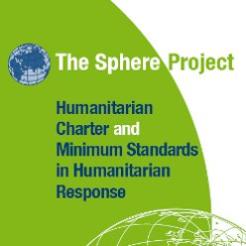Following the recent resignation of Oxfam's Haiti director following staff misconduct, Andrew Chaggar discusses standards and accountability for international aid organisations.
It was recently reported that Oxfam’s country director in Haiti had resigned following staff misconduct under his management.
Oxfam has stressed that no beneficiaries were involved, and that there was no misuse of donations, but few other details have been released. This makes commenting on the case difficult, but the incident does raise the issue of how organisations and people working in disaster zones are held accountable for their conduct and performance.
Up until around the mid-1990s there was a tendency to view humanitarians with almost a deferential status. The very fact that people were willing to work in difficult and often dangerous conditions to relieve the suffering of others was considered good enough in itself.
However by the end of the same decade the humanitarian system started to come under increasing, sometimes scathing, criticism. For example, books such as Alex de Waal’s Famine Crimes portrayed aid agencies as competitive, ineffective and in the worst cases, actually making matters worse such as by fueling conflicts. Such criticisms continue to this day, both in the mainstream media and in more recent books such as Linda Polman’s War Games.
To defend against these attacks and improve overall performance, a wide variety of accountability initiatives have been developed, including the Red Cross/NGO Code of Conduct and the Sphere Project’s Minimum Standards in Humanitarian Response.
One noted issue with such codes and standards however is that their adoption is voluntary and that no international authority exists to sanction non-compliance. As a result the standards of accountability actually met will often depend as much on the internal values of an aid provider than anything else.
For example Oxfam’s staff in Haiti were found guilty of misconduct following an internal investigation and judged against the charity’s own code of conduct. The question posed by this is what happens when incidents occur within organisations that are not committed to up-holding high standards of conduct and performance? Who then holds them to account?
In the private sector, even when regulations are relaxed, the general theory is that consumers can punish businesses whose products or behaviour they don’t like by taking their money elsewhere.
In the case of charities the closest equivalent to this would be donors withdrawing their support from NGOs deemed to be acting or performing badly. Humanitarian donors are increasingly demanding more value for money and greater measurable impact on disaster affected populations. So, is this enough to ensure appropriate accountability? Well, no, not in itself.
Protecting beneficiaries
Disaster survivors, unlike donors or consumers of commercial products, cannot choose which NGOs they receive aid from, and often even not what form such aid takes. As I discussed in my blog last month this is particularly problematic when the priorities of donors and beneficiaries are not aligned, or even contradict. When this happens it is usually the views of survivors which go unheard and this, in turn, frequently leads to unsuitable aid and ineffective programming outcomes.
Happily, there are signs that accountability to beneficiaries is improving. In 2003 the Humanitarian Accountability Partnership (HAP) was established with the express mission of making humanitarian action accountable to its intended beneficiaries. Although adoption of its standards are still voluntary, HAP facilitates independent audits of compliance and awards certification depending on results.
Securing HAP certification allows NGOs to demonstrate that they are committed to beneficiary accountability. This is useful as some donors, who can penalise or reward charities, are starting to care about beneficiary accountability. For example in 2009 the UK’s Disasters Emergency Committee adopted a new evaluation policy which requires its member charities, who receive funding through public appeals, to commission independent evaluations that explicitly consider accountability to beneficiaries.
While these are positive steps much remains to be done however. The 2010 results of HAP’s Annual Survey of Perceptions on Humanitarian Accountability show that while perceived accountability to beneficiaries has significantly improved over the past five years, the donor community is still perceived to be the group to whom humanitarians are most accountable.
Until this situation is reversed, waste, ineffectiveness, and resultant criticism will continue. HAP sums up the situation nicely:
"...The longer that agencies postpone such consultation [and accountability], the greater the quotient of waste and inefficiency in their work. But, as well as the cost-effectiveness of humanitarian action being at stake, so too is the dignity of disaster survivors, and relief work that treats them as little more than objects to be fed, watered and housed, scarcely deserves to be described as humanitarian."
For now, much will continue to depend on the internal values and standards of NGOs which self-regulate. Many, like Oxfam, do set themselves high-standards. Sadly, many others, do not.










